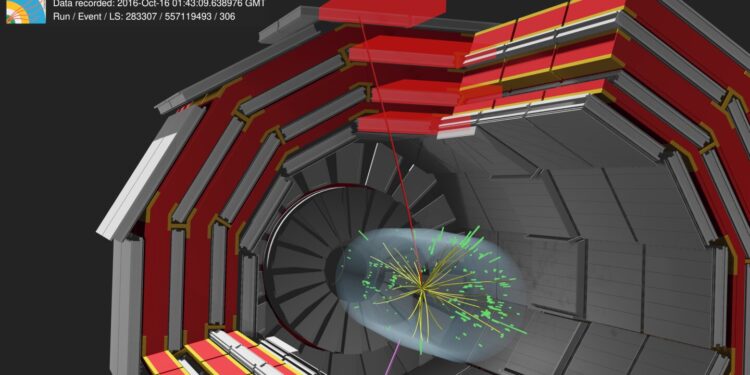CMS candidate collision between a W boson decaying into a muon (red line) and a neutrino escaping detection (pink arrow). Credit: CMS/CERN
The CMS experiment at CERN is the last to have evaluated the mass of the W boson, an elementary particle which, with the Z boson, is at the origin of the weak force, responsible for a form of radioactivity and initiating the nuclear fusion reaction which powers the Sun.
At a workshop at CERN on 17 September, the CMS collaboration explained how it analysed proton-proton collision data from Run 2 of the Large Hadron Collider, the Laboratory’s flagship particle accelerator, to make its first mass measurement of this fundamental particle.
The result is the most precise measurement of the W mass made so far at the LHC, and is consistent with the prediction of the Standard Model of particle physics and all previous measurements except the measurement by the CDF experiment at Fermilab’s former Tevatron proton-antiproton collider.
In the Standard Model, the mass of W is closely related to the strength of the interaction unifying the electromagnetic and weak forces and to the masses of the Higgs boson and the top quark, which limit its value to 80.353 million electron volts (MeV) with an uncertainty of 6 MeV.
Measuring the mass of the W boson with high precision therefore allows us to check whether or not these properties align consistently with the Standard Model. If not, the cause could be new physical phenomena such as new particles or interactions.
Since its discovery at CERN about 40 years ago, the mass of the W boson has been measured with increasing precision by several collider experiments, at CERN and elsewhere. In 2022, a surprisingly high value of its mass measured by the CDF experiment plunged the particle into a “midlife crisis”. The CDF W boson mass, 80,433.5 MeV with an uncertainty of 9.4 MeV, deviated significantly from the Standard Model prediction and other experimental results, requiring further studies.
In 2023, the ATLAS collaboration, which had provided its first mass measurement of the W boson in 2017, published an improved measurement based on a reanalysis of proton-proton collision data from the first LHC run. This improved result, 80,366.5 MeV with an uncertainty of 15.9 MeV, is consistent with all previous measurements except the CDF measurement, which remains the most precise to date, with a precision of 0.01%.
The CMS experiment contributed to this global endeavor with its first measurement of the mass of the W boson. The highly anticipated result, 80,360.2 with an uncertainty of 9.9 MeV, has a precision comparable to that of the CDF measurement and is consistent with all previous measurements except the CDF result.
“The wait for the CMS results is now over. After careful analysis of the data collected in 2016 and after completing all the cross-checks, the CMS W mass result is ready,” said Patricia McBride, outgoing CMS spokesperson. “This analysis is the first attempt to measure the W mass in the challenging collision environment of the LHC’s second run. And all the hard work of the team has resulted in an extremely precise W mass measurement and the most precise measurement of the LHC.”
“Measurements of the W boson mass are very difficult, because they involve delicate measurements and theoretical modeling of the production of the W boson and its decay into a lepton (here, a muon) and a neutrino that escapes detection,” explains Gautier Hamel de Monchenault, new spokesperson for the CMS.
“By exploiting the CMS detector’s ability to measure muons with high precision and by using the latest and most advanced theoretical ingredients, some of which have been tested by cross-analysis, we have achieved this record level of precision.”
This result demonstrates once again the exceptional performance of the LHC and its detectors, which continue to push the limits of precision and subject the Standard Model and its extensions to ever more rigorous tests. New data from the third run of the collider and its upgrade, the High-Luminosity LHC, are expected to push these limits further.
More information:
Article: Measurement of the mass of the W boson in proton-proton collisions at √s = 13 TeV
Quote: CMS experiment at CERN gives its opinion on the mass of the W boson (2024, September 17) retrieved on September 17, 2024 from
This document is subject to copyright. Apart from any fair dealing for the purpose of private study or research, no part may be reproduced without written permission. The content is provided for informational purposes only.



